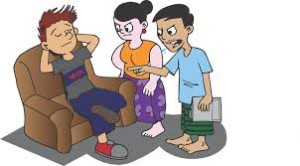By Tana Burkhart
Entertainment Editor
People tend to use the term “helicopter parent” fairly loosely these days. For some kids, this type of parenting is all too real, though, and can cause a lot of harm to their development and life-skills later on in life.
Some researchers have found that this type of parenting can cause students to, in turn, treat their peers in a similar manner.
“The correct and healthy progression of parenting is to eventually let go,” says Nathan Gandy, Crowder College psychology instructor “The goal is to do less and less while the kid stays on course.”
Gandy went on to discuss that both extreme styles of parenting, authoritarian and overly-lax, can certainly cause social and behavioral issues that roll over into adulthood. He talked about how even though these parents can mean well, a better way to go about parenting is to acknowledge that it is okay to feel worried, but respect that as a child grows it is your job to teach them how to be on their own one day.
Many students who come from a controlling household have had a lot of responsibilities with very little privileges. Parents, in these instances, want a certain outcome and know they can achieve it through manipulation. They don’t provide their children enough social training, and also never allow them to experience failure by hindering them from doing anything on their own.
Students who have dealt with controlling parents can even hold the idea that they need to be co-dependent. They sometimes look for another authoritarian figure to control them, which can even lead to an abusive relationship in some cases.
Not all kids that grow up like this end up the same, though. Some are very resilient and learn how to deal with life and all the curveballs just fine.
Sometimes, this need to control as a parent comes from a similar experience growing up or even from having the opposite upbringing. For some, though, their hearts really can be in the right place. Actually, many parents who use this parenting style honestly believe they are not doing anything out of the ordinary.
Watching your child leave for college can be a scary experience. Parents sometimes are just trying to protect what doesn’t need protecting anymore. And while this is a seemingly loving gesture, it can still reap some negative consequences when all is said and done.
Today’s technology may also be playing a role in why parents can’t let go. Jamie Abaied, a University of Vermont psychologist, suggests that keeping in constant contact with children through texting and social media is hindering them from learning any kind of independence.
Richard Mullendore, a University of Georgia professor and former Vice President of student affairs at the Universities of Georgia and Mississippi believes the cellphone to be “the world’s longest umbilical cord.”
Another thing pointed out consistently is the fact that a lot of students run a little too wild with the freedom they possess when away at college. It is far too common to see a student who was held back for 18 years finally reach adulthood and unleash all the repressed desires to indulge in questionable behavior.
Destiny Pruett, an elementary education major at Crowder College, is currently still living at home with her mother. “She has not let up on me at all since high school,” says Pruett. “After my older sister moved out at 18, she actually got harder on me.” Pruett went on to point out that she does not have a driver’s license because her mom likes to control when she comes home, where she works and how long she stays at certain places.
Many students have written and told stories of all the “sheltered” kids going crazy at frat parties or other social events. The same kids that make these bad decisions are the ones calling their parents the next day to help them fix whatever they messed up the night before.
The same thing frequently happens coming from the other extreme as well. The kids who were allowed to do anything and everything they wanted without question tend to grow up with little sense of self control and a difficulty with social conflict resolution.
The students who seem to handle the situations adulthood brings the best are the ones who had parents who understood that they needed to allow their kids to experience things at the appropriate time.
A lot of the time, parents see college as a good they are purchasing and want to be involved to know that they’ve made a good investment. While that is understandable, parents need to realize their primary goal is to raise productive members of society who eventually have to leave the nest. Parents who get that seem to have a decent grasp on the balance between what can slide and where to draw the line and aren’t afraid to let their children make a mistake and will offer guidance without being a control-freak.
Many colleges today are implementing programs to aid parents in striking a good balance. Some are even creating jobs for staff members to handle calls and inquiries from parents.

Leave a Reply